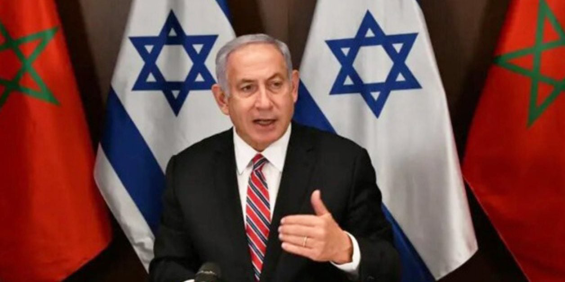The National Institute for Security Studies (INSS), affiliated with Tel Aviv University, has expressed concern over the potential impact of widespread Moroccan rejection of Israeli aggressions in Gaza on future relations between Morocco and Israel. These concerns, the INSS notes, are supported by the latest Arab Barometer survey published on June 7, which shows that 87% of Moroccans oppose normalization with Israel, up from 69% in 2022.
«Since October, almost weekly protests have been held in Morocco in support of the Palestinians, commonly calling for severing of ties between Israel and Morocco», the INSS states.
In response to these findings, the INSS has cautioned the far-right government led by Benjamin Netanyahu, in power since December 2022, about the possibility of the Moroccan authorities taking actions beyond the usual statements condemning the Israeli army's massacres against Palestinians.
«Israel would do well to remember that Morocco’s support for the Palestinians may extend beyond lip service. During the Second Intifada, Morocco went as far as severing relations with Israel due to the conflict’s escalation, and it took nearly twenty years to renew them», warns the INSS.
Reflecting on the Second Intifada
The INSS recalls how Morocco had ceased political and diplomatic normalization with Israel, which was initiated by King Hassan II after the Oslo Accords were signed on September 13, 1993. This decision came in response to Ariel Sharon's controversial visit to the Al-Aqsa Mosque esplanade in September 2000, an event that sparked the Second Intifada.
While the INSS acknowledges that the war on Gaza has not negatively impacted trade and security cooperation between the two countries, it regrets that the situation has significantly affected «diplomatic ties, official visits, and tourism». This sentiment was echoed by «The Washington Institute for Near East Policy» in a report published on October 25, 2023.
The «Abraham Accord Peace Institute (AAPI)» also noted this impact. Despite celebrating a record in trade exchanges between Rabat and Tel Aviv in 2023, amounting to $116.7 million compared to $56.2 million in 2022, the AAPI reported that the Gaza conflict disrupted relations between the two states. This disruption is evidenced by a significant decrease in Israeli tourists visiting Morocco in 2023—50,548 compared to 74,648 in 2022, a 32% drop.
Since October 7, no Israeli minister or senior official has visited Morocco. Earlier the year, the kingdom hosted several Israeli ministers including Moshe Arbel (Interior and Health) and Ofir Akunis (Technology and Innovation) in June, Miri Regev (Transport) in May, and Nir Barkat (Economy and Industry) in May. Amir Ohana, President of the Knesset, also visited the kingdom. Prime Minister Benjamin Netanyahu had even planned a trip to Morocco.





 chargement...
chargement...












